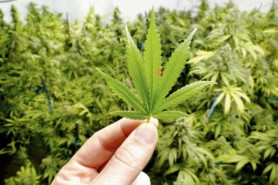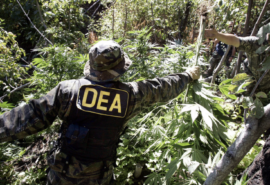Posted on 11 Mar 2019
The creeping legalization of cannabis may have several undesired, uncertain and unforeseen consequences. Not least is the question of how a market disrupted by decriminalization will impact the dealers of cannabis.
The principal legislation governing the regulation of controlled drugs in the United Kingdom is the Misuse of Drugs Act 1971. This legislation has been around for longer than I have (and I have 24 years of experience as a law-enforcement officer), and there has been no significant amendment to the Act since its introduction.
However, the recent acceptance by the UK Home Secretary, who is responsible for criminal-justice matters, of ‘medicinal research’ applied to cannabis seems to herald a change in the country’s drugs policy. It also fits with the general pattern of cannabis decriminalization in various countries.
I have spent a considerable part of my career investigating the trade in illegal drugs and the organized-crime structures that facilitate it. My experience concurs with Dr Frederik Desroche’s opinion that ‘like business persons engaged in licit markets, dealers are rational actors who focus on profit, seek out economic opportunities, take into consideration the competition, are careful with their money, and attempt to minimize risk’.
Furthermore, as Gerard McAlwee and Robert Smith note in Exploring Criminal and Illegal Enterprise, drug dealers operate to a degree in a grey environment where ‘the dividing line between legality, illegality and criminality is often quite thin’. The questions that immediately occur to me when I consider the potential legitimization of the cannabis market are: what will happen to the dealers? Would they step across the line to operate in a legitimized market? And would they even be able to do so?
Impacts of legalization: Police detectives share their views
In an attempt to answer these hypothetical questions, I sought the assistance of about 20 currently serving and ex-colleagues – all of them either former or current detectives involved in narcotics investigations, ranking from constables to force executive members. I gathered the views of this sampling through a questionnaire on the sellers of both herbal or grown cannabis and cannabis resin, in which I encouraged them to provide context to their thoughts. It may not be a comprehensive or representative sample, but it produced some interesting conclusions all the same.
The vast majority of respondents said that, in their experience, sellers of cannabis resin and herbal cannabis were involved in other kinds of criminality, including fraud, burglary, receipt of stolen goods, and particularly human trafficking.
More than half of the respondents noted that, in their experience, sellers of cannabis resin dealt in multiple commodities. By contrast, only a third could say this about dealers of herbal cannabis.
Two respondents remarked that just as cannabis use is viewed by some as a gateway to the consumption of harder drugs, similarly, cannabis dealing is often an initial step to becoming involved in dealing in more dangerous commodities.
The opinions provided were remarkably clear on the capacity of either dealer group to legitimize the trade. With respect to both groups, the officers generally felt that dealers would not have the necessary skills or desire to make the move to legal trading. One respondent summarized this view as follows: ‘These people would not be able to compete with multinational companies that would take over the legitimized market. They could not sustain health and safety, and other regulatory laws that would be introduced. In addition, these criminals are not willing to pay tax on their business earnings.’
Over two-thirds of respondents believed that the legitimization of the cannabis market in the UK would be accompanied by an increase in other types of criminality, particularly a move by dealers into the trading of other, harder, controlled drugs. Given the skills that such dealers have in respect of operating in a criminal environment, and the extent of their networks, such a move would not come as a surprise; it would also fit with the current accepted academic opinion on criminal entrepreneurship.
A small number of respondents expressed the belief that dealers would be capable of legitimizing their trade. However, one of the officers noted that this would most likely be restricted to the upper echelons of criminal circles, remarking that ‘many of the heads of organized-crime groups are effectively criminal entrepreneurs, who are very good at making money from any “business” opportunity […] and almost 100% of the time they would not care about the consequences’.
Another concluded that legalization had a notable benefit, in that it would remove the risk of large sections of the population coming into contact with ‘criminals who would seek to exploit them’.
Lesson from history
Although the legalization of cannabis consumption in the UK would be a change of a kind unprecedented in drugs policy in modern Britain, it does have a historical parallel in the form of the 1933 repeal of the prohibition of alcohol in the United States.
Scholars who have considered the impact of the prohibition repeal found that although there was a significant drop in recorded offences associated with organized crime in the years immediately following the repeal, this masked a diversification among established organized-crime networks into other drug markets, which ultimately led to the vast drug-supply networks and associated criminality we face today. Prohibition effectively established organized crime in America, providing unprecedented opportunities to what had been largely amateurish networks, and its unmanaged withdrawal arguably led to the widespread drugs market that the Western world currently experiences.
Taking into account this historical precedent and respondents’ remarks that dealers might branch out into trading in other illicit commodities should the cannabis market be legalized, it is clear that any decision to alter the status quo should be made with a good degree of caution. After all, the effects of the change could take a considerable amount of time to make themselves known.
Mental health
The Heath and Medicine Division of the US National Academy of Sciences recently released a report that makes clear how little is really known about the long-term effects of cannabis use. Many professionals have warned about its impact on mental health, most notably the potential link to increased risk of schizophrenia, and associated acts of violence.
A number of the officers who participated in the interview also warned of the detrimental effects of cannabis use on mental health, which they had observed over the course of their careers. One respondent recalled: ‘My initial experience of policing the misuse of cannabis was almost entirely with resin or oil. Come the onset of herbal cannabis, it had a dramatic effect on young people, particularly men. People whom I had dealt with and had known well started to show symptoms of paranoia, and I know of at least two of them who committed suicide’.
It is reasonable to suppose that individuals with such mental-health problems will perhaps bring increasing levels of violence to a milieu where violence already plays a key role in disputes and their management. Given the largely unknown health consequences, which may take decades to be fully understood, and particularly the impact of legalization on a segment of society where violence is already prevalent, any loosening of legislative controls requires a very nuanced and considered approach.
Mitigating the impacts
The legalization of the cannabis market in the UK (and elsewhere), should it occur, will no doubt have an impact on transnational organized-criminal networks. However, as yet, no significant study has been conducted in this regard. If the direction of travel continues to be towards legalization, then such a study would appear to be necessary. And, in it, careful consideration should be given to the likely development of new criminal networks as others adapt to the change. Furthermore, attention should be paid to how those currently involved in the trade are to be handled, and perhaps even assisted, in their transition from the criminal to the legitimate sphere of operation. Admittedly, this will not be without controversy.
Accepting the need for such a form of assistance would require delicate handling, and some degree of ‘amnesty’ consideration may seem unpalatable. However, if these issues are not addressed, we may well be doomed to repeat the lessons of prohibition, and will probably see criminality move into established and new markets, with significant disruption to established organized criminality and associated ‘legitimate’ enterprises, with violence the likely outcome.
Providing drug dealers with a ‘route to legitimization’ may sit uncomfortably with many. However, the alternative scenario of death by a thousand cuts, as the ‘redundant’ dealers slowly branch out into other forms of criminality, with little control from the state, seems a far worse outcome. Many dealers are likely not to want, or be able to, move into the legitimate segment of the drugs trade as major commercial operators enter this new market, so reasoned alternatives for these individuals should be sought. Although any measures to mitigate the possibility of dealers diversifying may only have a small impact, this is surely better than no positive impact at all.
For once, we should try to be ahead of the curve, acknowledging the likelihood of legitimization, researching its potential impacts, and establishing mitigation measures before it is too late. I have no sympathy whatsoever for drug dealers, but I genuinely fear the implications of a wholly uncontrolled removal of an income stream from their control.



